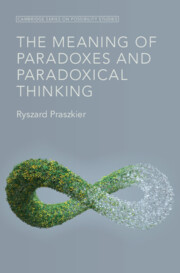Book contents
- The Meaning of Paradoxes and Paradoxical Thinking
- Cambridge series on possibility studies
- The Meaning of Paradoxes and Paradoxical Thinking
- Copyright page
- Contents
- Figures
- Tables
- Acknowledgments
- Introduction
- Part 1 Paradoxes and What They Do to Us
- Part II Sudden Unexpected Changes
- Part III Challenging the Impossible
- Part IV Peace and Its Challenges
- Part V Paradoxes and Creativity
- Part VI Paradoxes in Action
- Introduction
- Chapter 15 Turning the Impossible into the Possible
- Chapter 16 Paradoxes in Psychotherapy
- Chapter 17 Life and Paradoxes
- Discussion and Summary
- Chapter 18 Précis
- References
- Index
Chapter 18 - Précis
from Part VI - Paradoxes in Action
Published online by Cambridge University Press: 04 April 2025
- The Meaning of Paradoxes and Paradoxical Thinking
- Cambridge series on possibility studies
- The Meaning of Paradoxes and Paradoxical Thinking
- Copyright page
- Contents
- Figures
- Tables
- Acknowledgments
- Introduction
- Part 1 Paradoxes and What They Do to Us
- Part II Sudden Unexpected Changes
- Part III Challenging the Impossible
- Part IV Peace and Its Challenges
- Part V Paradoxes and Creativity
- Part VI Paradoxes in Action
- Introduction
- Chapter 15 Turning the Impossible into the Possible
- Chapter 16 Paradoxes in Psychotherapy
- Chapter 17 Life and Paradoxes
- Discussion and Summary
- Chapter 18 Précis
- References
- Index
Summary
Paradoxes may be perceived as the core of philosophy. This book is a journey through the meaning and essence of paradoxes, the way our minds deal with them, and how societal dynamics sometimes generate unpredictable, astounding phenomena. It considers the mind’s specific characteristics that enable perceiving insurmountable challenges as doable, and how this way of thinking contributes to peacemaking. Moreover, it analyzes the paradoxical aspects of creativity, demonstrating the mechanisms fostering divergent thinking and neuroplasticity and the role of joy. Finally, it presented paradoxes in action. The paradox of generosity shows that more generous people are happier, suffer fewer illnesses and injuries, live with a greater sense of purpose, and experience less depression. The paradox of happiness says that striving for happiness undermines happiness; instead, doing meaningful things and having meaningful relationships fosters happiness indirectly. Openness and propensity to paradoxes may be a source of inspiration and a fulcrum for novel and successful actions. This tendency, called paradoxicality, may augment creativity and neuroplasticity. Paradoxes generally arouse surprise and wonder. The latter is perceived as a special starting point for philosophy, seemingly because it is a transformational state of mind in which we become aware of an expanded field of possibility
- Type
- Chapter
- Information
- The Meaning of Paradoxes and Paradoxical Thinking , pp. 145 - 147Publisher: Cambridge University PressPrint publication year: 2025

